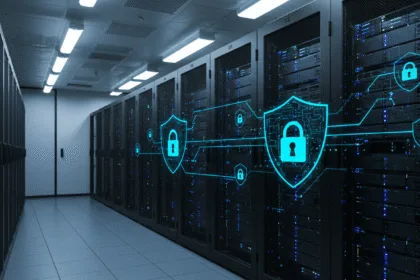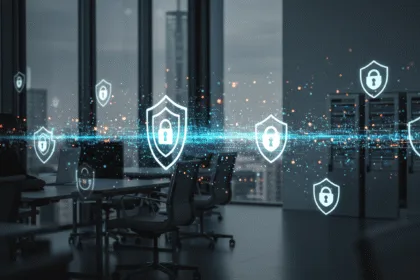In 2025, cybersecurity isn’t optional — it’s essential.
Every day, hackers target businesses of all sizes, looking for vulnerabilities to exploit. Whether it’s stolen customer data, ransomware attacks, or phishing scams, the risks are real — and growing.
- 1. Use Strong and Unique Passwords
- 2. Enable Multi-Factor Authentication (MFA)
- 3. Keep Software and Systems Updated
- 4. Educate Your Employees
- 5. Use Reliable Antivirus and Firewall Protection
- 6. Back Up Your Data Regularly
- 7. Secure Your Wi-Fi Networks
- 8. Implement Access Controls
- 9. Monitor and Audit Your Systems
- 10. Develop a Cybersecurity Incident Response Plan
- Why Cybersecurity Is Non-Negotiable in 2025
- Partner with Sparktopus for Complete Cybersecurity Solutions
The good news? With the right cybersecurity strategies, you can safeguard your company’s data, reputation, and profits.
Here are 10 powerful cybersecurity tips every entrepreneur and business owner should implement immediately. You may also like to read: 7 Powerful Cyber Security Tips to Protect Your Business
1. Use Strong and Unique Passwords
Weak passwords are an open door for hackers.
One of the simplest yet most effective cybersecurity tips is to create strong, unique passwords for all accounts. Avoid using the same password across multiple platforms.
Pro tip:
Use a mix of uppercase and lowercase letters, numbers, and symbols. Better yet, adopt a password manager to generate and store complex passwords securely.
Why it matters:
Over 80% of data breaches happen due to weak or stolen passwords. Strengthening your login credentials is your first line of defense.
2. Enable Multi-Factor Authentication (MFA)
Even the strongest password can be compromised. That’s where multi-factor authentication (MFA) comes in. MFA adds an extra layer of protection by requiring users to verify their identity using another method — like a code sent to their phone or fingerprint recognition.
Why it matters:
MFA reduces the risk of unauthorized access by over 90%. It’s quick to set up and extremely effective for protecting sensitive data.
3. Keep Software and Systems Updated
Outdated software is one of the easiest targets for hackers. When you ignore updates, you leave known security holes open for exploitation.
Quick fix:
Set your systems, antivirus, and apps to update automatically. Regularly patching vulnerabilities ensures your digital infrastructure remains secure against emerging cyber threats.
4. Educate Your Employees
Human error is often the weakest link in cybersecurity.
Many cyberattacks start with a simple phishing email — one employee clicks a malicious link, and your entire network is compromised.
What to do:
Host regular training sessions to help employees recognize phishing attempts, fake websites, and suspicious attachments. Make security awareness a part of your company culture.
Pro tip:
Run simulated phishing tests to measure awareness and keep your team alert.
5. Use Reliable Antivirus and Firewall Protection
Think of antivirus software and firewalls as your company’s digital gatekeepers. They detect, block, and remove malicious software before it can cause damage.
Why it matters:
Modern antivirus tools go beyond basic protection — they also monitor network behavior, detect ransomware, and isolate threats in real time.
Tip:
Choose trusted cybersecurity vendors and update your security tools regularly for maximum effectiveness.
6. Back Up Your Data Regularly
Imagine losing all your customer data, invoices, and files overnight due to a cyberattack. Scary, right?
That’s why data backups are critical. Regularly back up your files — both offline and in the cloud — so you can recover quickly in case of ransomware, accidental deletion, or hardware failure.
Pro tip:
Use the “3-2-1 rule”:
-
Keep 3 copies of your data
-
Store on 2 different media
-
Keep 1 copy offsite or in the cloud
This ensures your business stays resilient even after a cyber incident.
7. Secure Your Wi-Fi Networks
An unsecured Wi-Fi network is an open invitation for hackers.
Always encrypt your Wi-Fi and hide your network name (SSID). Use strong passwords and change them regularly — especially after staff turnover.
Why it matters:
Cybercriminals can easily intercept unprotected Wi-Fi traffic, giving them access to confidential files or customer information.
Pro tip:
Set up a separate network for guests or IoT devices to reduce risks.
8. Implement Access Controls
Not every employee needs access to every file or system.
Use role-based access controls (RBAC) to limit permissions to only what’s necessary. This minimizes exposure if an account is compromised.
Example:
Your marketing team shouldn’t have access to financial records, and vice versa.
Why it matters:
Even one insider mistake or breach can lead to massive data loss. Controlling access prevents misuse and limits potential damage.
9. Monitor and Audit Your Systems
Cyber threats evolve daily — staying proactive is key.
Set up monitoring tools to track suspicious activities like unusual logins, file changes, or network spikes.
Pro tip:
Schedule monthly cybersecurity audits. These help identify weaknesses, outdated software, or unused accounts that could pose risks.
Bonus tip:
Consider working with a professional cybersecurity partner to perform penetration testing and system scans.
10. Develop a Cybersecurity Incident Response Plan
Even the most secure systems can be attacked. The key is knowing how to respond.
Create a cyber incident response plan that outlines steps to take if your business experiences a breach.
Include details like:
-
Who to contact (IT team, legal, PR)
-
How to isolate affected systems
-
Communication protocols
-
Recovery and post-incident review
Why it matters:
Having a plan reduces panic, downtime, and financial loss during an emergency. It shows preparedness — a trait investors and customers appreciate.
Why Cybersecurity Is Non-Negotiable in 2025
The digital landscape is more connected than ever — but that also means more exposure. Businesses now face risks from ransomware, data leaks, and AI-driven attacks that can happen in seconds.
Cybercrime damages are expected to exceed $10 trillion globally by 2025.
That’s not just a tech issue — it’s a business survival issue.
By prioritizing these cybersecurity tips, you protect your brand reputation, maintain customer trust, and ensure uninterrupted business growth.
Partner with Sparktopus for Complete Cybersecurity Solutions
Protecting your business goes beyond installing antivirus software — it requires strategy, technology, and expertise.
At Sparktopus, we help companies strengthen their digital defenses with:
-
Advanced threat monitoring
-
Data protection systems
-
Employee security training
-
Secure cloud infrastructure
Our experts design custom cybersecurity plans tailored to your business goals — so you can focus on growth while we handle protection.
Ready to Secure Your Business Today?
Don’t wait for a cyberattack to take action.
Book a free cybersecurity assessment with Sparktopus and discover how to keep your data, customers, and profits safe in 2025













